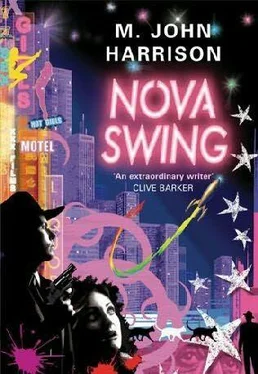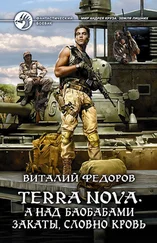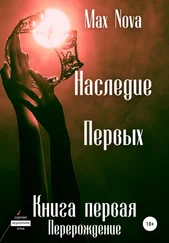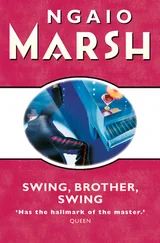"Do you have the same view as me?" the assistant said in an excited voice. "From about waist height? And there's a woman in a red dress to the right of the bar?"
"That's the view I have."
"There he is. Do you see him? He said he never heard of the Cafe Surf, but there he is! This is exactly what we need!"
Aschemann wasn't so sure. He asked her to close the pipe, and when his vision had returned to normal said, "All I see is a man having a drink in a bar. If that was illegal we would all be in the orbital correction facility. Where did Vic go after he left?"
"They don't know."
"That's helpful."
"If you watch the whole thing, the fault gets out of hand about two hundred and eighty seconds in, and they disconnect everything to fix it."
Aschemann thanked her for the pictures. "Go home now," he recommended. "Get some sleep. We have a lot to think about here." He rubbed his eyes and looked around the room his wife had died in. He would be there until morning, sprawled in a stained yellow armchair and surrounded by her things. He would hear her voice, asking him what day it was, offering him a drink. He spent more time in that house than he would admit to his assistant; and missed his wife more than he would admit to himself.
Something in the Cafe Surf footage had caught Aschemann's attention, but he couldn't say what it was. Then, the evening of the next day, as he sat at the Long Bar listening to the two-piece, a young woman took the stool next to his and ordered a cocktail called "Ninety Per Cent Neon." She was a Mona, so he thought at first, a Monroe look-alike in a red wrap-bodice evening dress and matching stilt-heel shoes.
"I've seen you here," Aschemann said.
She leaned towards him when he spoke. Asked him for a match, upper body bent forward a little from the waist, head tilted back so that the dress offered her up wrapped in silk, jazz, light from the Live Music Nightly sign. She needed only a brushed aluminium frame to complete the image of being something both remembered and unreal. He'd seen that dress in the nanocam pictures of Vic Serotonin. More importantly, perhaps, he'd seen it fourteen days ago, when she stumbled out of the toilet at the Cafe Surf disoriented by the neon-light and music as if she was new in the world. She still had an unformed, labile air. Her smile was cautious, but the dress was ready to promise anything.
"I'm here a lot," she said. "I like the band. Do you like them?"
He took a moment to light his pipe. He swallowed a little rum. "They're as guilty as ever," he said.
"Guilty?"
"Under his dexterity, this pianist hides neither intellect nor heart, only compulsion. If no one else is available he will play against himself; and then against the self thus created, and then against the self after that, until all fixed notion of self has leaked away into the slippage and he can relax for a second in the sharp light and cigarette smoke like someone caught fleetingly in an ancient black and white photograph. Do you see?"
"It's only music, though," she said.
"Perhaps," Aschemann agreed. For the detective, he thought, nothing is ever only itself. He offered to buy her another cocktail, but all she did was look at him vaguely as if she hadn't heard, so he went on:
"The older man has come to a different understanding of things, one which to his friend would seem bland and self-evident. He believes that it is only because no music is possible that any music at all is possible." Here, Aschemann smiled briefly at his own cleverness. "As a result," he finished, "the universe now remakes itself for him continually, out of two or three invariable rules and an obsolete musical instrument called the saxophone."
"But guilty? Is that enough to make them guilty?"
The detective shrugged. "Complicit, then. It's only a way of putting it. Myself, I prefer the New Nuevo Tango. There's more heart."
She stared at him, got down off the stool, laughed in a nervous way which revealed the flecks of lipstick on her white teeth. He caught briefly the smell of her, strong, warm, a little unwashed, a little cheap; in some way reassuring.
"Goodbye," she said. "Maybe I'll see you again."
Aschemann watched her leave, then finished his drink and shadowed her unhurriedly into the warm air and black heart of the city. He could smell the guilt and excitement that came up out of the street gratings to meet her. He could smell her excitement at being alive there, in Saudade among the sights. Did she know he was behind her? He wasn't sure how she saw the world, but she hadn't forgotten him. He was certain of that, but he wasn't certain how dangerous she might be. He followed her to a coldwater walk-up behind the bottled-milk dairy at Tiger Shore, running up the last few metal risers of the outside staircase to catch her and lay his hand on her warm shoulder. His footsteps rang and scraped, she fumbled with the door. Dropped the key. Picked it up.
"Wait," he ordered. "Police. Don't go in without me."
She stared at him in despair; then over his shoulder, less as if there was someone there than at the city itself. "Please!" she said. "I don't know what I've done wrong."
"Neither do I."
Whatever happened next, he wanted to make sure he was there.
It was bare: grey board floor, bare bulb, a single bentwood chair. On the wall opposite the window, the shadow of the slatted blind fell across a poster with the logo SurfNoir. "Hey," she said. "I know: why don't you sit here-?" When she bent forward from the waist to undo his raincoat, the red dress presented her breasts to him in a flickering light. She knelt, and he could hear her breathing. It was placid, rather catarrhal. Later she lifted the hem of the dress and positioned herself astride him. So close, he saw that her gait, the shadows round her eyes, the foundation caked in the downy hairs by the corners of her mouth, had conspired beneath the Cafe Surf neon to make her seem older than she was. She whispered when he came, "There. There now." She had been a month in the same dress. She was a victim, but of what? He wasn't sure. He had no idea what she was. How had he smelled her excitement yet failed to smell his own? He felt weakened by it.
"Where do you sleep?" he said puzzledly. "There's no bed in here."
This idea let in a moment of confusion. It was very brief. But when he shook his head to clear it and turned to pay her, she was standing in the corner motionless with panic, facing the angle between the walls. She had learned enough to know what the city wanted but no more. New clothes were scattered across the floor, clean but disordered, as if she had tried to wear them but wasn't sure how. She had collected objects too, some coloured feathers on a stick, an unopened bottle of "Ninety Per Cent Neon." She started to fade as he watched, but he was out on the iron stairway long before the process was complete. He returned to the Long Bar, where he drank until he stopped shaking. Resting in the music and light he thought: does it matter who she was, when every night here the world is somehow touched? Guilt made him report to his assistant:
"I think I begin to see what's happening."
Two days later, hands in pockets at the end of an afternoon spent with his friend the bottle, Vic Serotonin lounged in the doorway of Liv Hula's bar watching the cats flow back into the event site. He had been waiting there five minutes and Straint was still thick with them.
"Pay that tab any time," Liv Hula reminded him from behind the zinc counter.
"Sure," Vic said.
He stood there a minute or two more without saying anything then turned up his collar and left.
Liv Hula rubbed at a stain on the counter. She threw the rag into the sink. "Always good to see you, Vic," she said quietly to herself. "Come again soon." She went upstairs and turned on Radio Retro, but they were just then announcing the evening's fights, and that only made her think of Joe Leone.
Читать дальше












